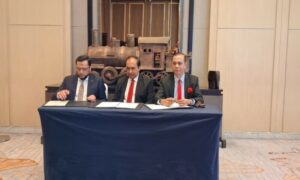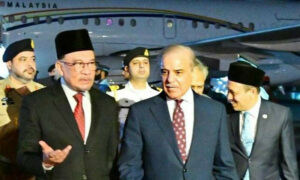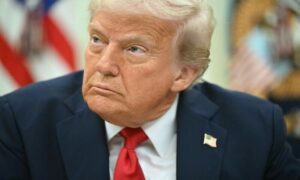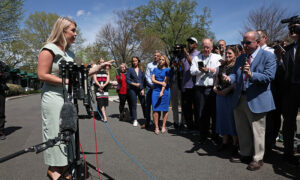The U.S. Embassy in Islamabad hosted a reception to commemorate the 247th anniversary of the independence of the United States of America. Prime Minister of Pakistan Mian Muhammad Shehbaz Sharif was the guest of honor, representing the people and government of Pakistan. In addition to celebrating Independence Day, the event recognized the achievements of the U.S.-Pakistan Green Alliance framework and looked ahead to the many opportunities for continued and expanded partnership between the United States and Pakistan.
The U.S.-Pakistan Green Alliance framework is a transformative initiative addressing today’s most pressing environmental challenges, especially around water management, climate-smart agriculture, and renewable energy. Beyond mitigating climate change and its effects, the partnership recognizes that green choices also present tremendous economic opportunities, opening doors for increased bilateral trade and investment, as well as the creation of new jobs and industries. The initiative actively promotes the inclusion of women in the economy to ensure that the path to a greener, more sustainable future is empowering for all.
Last year’s flooding in Pakistan served as a stark reminder that climate change is not a distant threat. As Pakistan continues to recover from the devastation and prioritizes a transition to clean energy and environmental stewardship, the United States will remain a steadfast partner. The United States has already pledged over $215 million to support the Pakistani people’s recovery and resilience to future disasters.
In his remarks, U.S. Ambassador Donald Blome noted the importance of values like innovation and creative problem-solving to the Green Alliance framework, which builds upon more than 75 years of friendship between the United States and Pakistan: “From the Green Revolution of the 1960s to today’s U.S.-Pakistan Green Alliance, we have forged a partnership that has weathered many challenges and become stronger. The past year has been a testament to the breadth of our relationship, with productive dialogues on health, the environment, energy security, and counterterrorism that strengthened our joint efforts to combat serious threats.”
As we celebrate the anniversary of U.S. independence, we do so recognizing the importance of partners like Pakistan. Through our long-standing relationship and joint efforts through initiatives like the Green Alliance framework, we embrace the power of collaboration and acknowledge that we can achieve far more together than we can alone.
Thank you all for joining us this evening. I am especially delighted to welcome Prime Minister Sharif – thank you, your Excellency, for representing the people and government of Pakistan at this special occasion.
On Independence Day, we remind ourselves of core American values – freedom, democracy, and equality. But today I also want to focus on other qualities we cherish in the United States: innovation and problem-solving.
From our nation’s founding, Americans have been trailblazers and pioneers. From the creativity of Silicon Valley founders to the courage of social justice advocates struggling for greater equality, our nation’s history is one of overcoming daunting challenges.
Pakistan of course is no stranger to daunting challenges, and the most significant challenges today revolve around finding a path to economic growth that can meet the needs of Pakistan’s next generation. All of us today are facing the reality of global economic patterns that are shifting due to rapid changes in technology and patterns of trade. These changes will reward the values of openness, innovation, and flexibility. Partnerships will be critical, and our economic partnership with Pakistan is expanding. The United States has long been a leading investor in Pakistan and Pakistan’s largest export market. We do over $9 billion annually in bilateral trade, and in the past year, U.S. investment in Pakistan went up by 50 percent.
In February, we hosted ministerial level meetings under the U.S.-Pakistan Trade and Investment Framework Agreement, where participants made significant progress on U.S. market access for Pakistani products, digital trade, and ensuring Pakistani women contribute to the nation’s prosperity. What’s more, we – and the host of major U.S. companies doing business in Pakistan – are committed to training the next generation of Pakistani entrepreneurs and businesspeople through investment in Pakistan’s human capital. In fact, U.S. companies and their local affiliates are among Pakistan’s largest employers, directly employing more than 120,000 Pakistanis. Extensive training programs provided by U.S. employers help the Pakistani workforce compete in the global economy and demonstrate Pakistan’s enormous potential. U.S. firms are global leaders in corporate citizenship, social responsibility, and transparency, and bring those values to the places, like Pakistan, where they invest.
Today, one of the most pressing global challenges is climate change, a reality Pakistanis know well from last summer’s tragic flooding. The United States stepped up, pledging over $215 million to support the Pakistani people’s recovery and resilience to future disasters. But our two countries can do much more together to address the threat that climate change poses to Pakistan, the United States, and the broader world.
I heard a saying recently that resonated and which, I think, captures the spirit of our partnership: “humaray safer ka her eik qadam kaleedi ahimiet rakhta hay” – each step of the journey is important. As we continue toward a more sustainable and prosperous future for both our countries, the U.S.-Pakistan Green Alliance will remain at the center of those efforts.
The U.S.- Pakistan Green Alliance is a transformative initiative between our two countries to address today’s most pressing environmental challenges, especially around water management, climate-smart agriculture, and renewable energy. Through the Green Alliance, we are working toward a more sustainable, resilient, and equitable future.
The Green Alliance also builds upon the rich history of our partnership in these areas. The United States supported Pakistan’s “Green Revolution” in the 1960s to boost agricultural production and food security. Similarly, U.S. investments in Pakistan’s hydroelectric sector helped electrify the country and boost economic opportunity for Pakistanis. As in the past, our continued partnership is yielding significant results.
Just a few months ago, our senior leaders met for a high-level Energy Security Dialogue and convened a working group on Climate and the Environment, both vital touchpoints for deepening the U.S.-Pakistan Green Alliance. Through these and other initiatives, we are making tangible progress toward a greener, more sustainable future for Pakistan.
But the Green Alliance framework isn’t only about mitigating climate change and environmental degradation. It also offers Pakistan tremendous economic opportunity by recognizing that green choices are also increasingly profitable and demanded by private markets. Through the U.S.-Pakistan Green Alliance, we can increase bilateral trade and investment and create new jobs, new industries, and new opportunities for our people.
For example, under the Green Alliance, the U.S. government is supporting the Lahore University of Management Sciences Electric Vehicle Research and Development Center as it develops domestically produced electric vehicles for the Pakistani market at commercial scale. This will help Pakistan as it works toward an ambitious target of 30 percent electric vehicle sales by 2030.
And this is just the beginning.
Last year’s flooding in Pakistan made clear that climate change is not a future threat. It has already arrived and doesn’t respect national borders.
I applaud the many government, business, and civil society leaders in Pakistan who have called for transformative change to advance your country’s climate resilience and energy independence. I was particularly encouraged by last September’s announcement that the Pakistani government will not launch any new power projects that run on imported fossil fuel. Looking ahead, the Green Alliance is advancing our cooperation in three primary areas.
First, as a global leader in renewable energy technology, the United States is helping Pakistan reduce its dependence on fossil fuels, lower carbon emissions, and improve energy security. This country is blessed with abundant sunshine, vast open spaces, and strong winds – all of which should make renewables an easy and economical choice. Just a few weeks ago, I welcomed back to Pakistan the second cohort of the U.S.-sponsored Future of Women in Energy Scholars Program, which aims to expand the number of women working in Pakistan’s energy sector.
Second, through the Green Alliance, we are helping Pakistan pivot to climate-smart agriculture. Through initiatives like our $20 million project to help farmers in Punjab and Sindh improve water use, we’ve already seen farm productivity increase by more than 10 percent. We must continue to work together to invest in new technologies like drought-resistant crop seeds that improve agricultural output while reducing environmental risk.
Finally, just as the United States was instrumental in constructing Pakistan’s most important dams and hydro-electric projects decades ago, we now look forward to continuing our long tradition of working side-by-side to improve water management. The United States has partnered with Pakistan to increase access to safe drinking water, improve water governance, and expand water storage capacity.
Of course, none of this will be possible without a business and regulatory environment that gives investors confidence to place their funds alongside public money. This transition will also require the full participation of women in the economy. Through the U.S.-Pakistan Green Alliance, the United States is committed to supporting Pakistan in making reforms that catalyze Pakistan’s green economy.
As we look back on more than 75 years of friendship between the United States and Pakistan, we should be proud of our accomplishments. From the Green Revolution of the 1960s to today’s U.S.-Pakistan Green Alliance, we have forged a partnership that has weathered many challenges and become stronger for them. The past year has been a testament to the breadth of our relationship, with productive dialogues on health, defense, and counterterrorism that strengthened our joint efforts to combat serious threats.
As we celebrate the United States’ Independence Day and the ties that bind our peoples and countries, I encourage you to look at tonight’s information display to learn about the many ways, including the Green Alliance, the U.S. Mission in Pakistan is investing in Pakistan’s environment and green economy.
Thank you again for joining us this evening.











